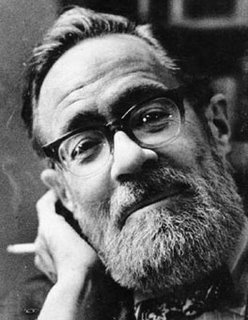 John Berryman was one of the very best poets of the last century.
John Berryman was one of the very best poets of the last century.On this day, in 1972, he jumped to his death from a bridge - no doubt the new year's demands weighing heavily on him.
I have written a poem with this very much in mind, published in my previous, third, collection, which I present below, offered in loving homage to one of dark-saddened wit's lyric masters.
A link to a site with much more about him is here:
http://www.poets.org/poet.php/prmPID/6
Berryman In Paris
1.
i think, walking home
from lunch, of john berryman.
how he put his glasses
in his shoe, before bed.
he had so many wives
he was practically a king,
indeed, henry. now, too, historical,
a figure who can no more dance
to the edge of a bridge
or tilt his glasses on the bridge of his nose.
he’s gone, not leaning in the door, about
to say or do something hilarious or sad,
play out some inner drama on a college
professor’s varsity stage — play out
on coeds or fawning poetry buffs,
or any chicken farmer with twenty bucks
to buy a lecture. instead of them,
the not here, we get debris;
which, in cases,
like these, is both
the losses of others/and poetry.
affairs seem likely in a university town,
by degrees of lust and luster are lost
so many campus sweethearts, and ph.ds
tossed from aleppo to princeton,
various ambitions circling honor and desire
with achievement’s alter side, sickness
at the dagger-minded, incarnadine price paid
by profs who want to write and get laid
and keep a family drama politely on ice;
the crux of any text or life is corruption
when the folio is separated from the author
for too long; when the words shift, wicked,
from page to performance, from politics
to partisan reviews, martini afternoons
with deans’ concubines and matriculating ingenues;
complexer the circuitous fall when plummet
measure’s grace, that especial favor, with past-times
that, curvaceous — that singular eye — pleasing deceit
of motion — miss the king to kill the thane.
crane and lear — rush jobs — not the three poems
necessary to enthrone one’s glint of genius...
2.
i wish john a. smith (his name
before his father predeceased him
purposefully with a gun to the temple in florida)
were here with me now.
i would like to buy him a drink
(regardless of consequences
or what this forgives)
and talk of cal, delmore, yeats, rp, randall
(that opinionated dandy, cruel and gentle
who hurt his peers into excellence or pall)
or girls with paprika in their veins —
how a well-curved bum sits well with us
august gentlemen; we’d rank his pals
in a boozy canon; and i’d ask him to pray
for me, as lowell did, most famously.
advice from such quarters
unlikely to be forthcoming,
i plunge over the past
and into the cold, quick-running
future — a mississippi — to consider
what time stores ahead for myself,
let alone those i might love.
how that joyless block
crawls into our fullness
and yanks us through
to be words, less read.
for him, berryman, to be dead
how, possibly, could it go better
for a later man? worried
by all the equally different
women, cigarettes, alcohol
and intoxicant all all all of life, and
who thinks too often
of first, last and interim things
that dance a limited evening
in paris, of the moment, where
eileen (his wife, remembering, no
mistress bradstreet she, a flesh
and bloodied rival to the unamused
obsessive of more maternal music)
was, with a second husband, diplomatic.
3.
after the first, poetic,
succumbed to succumbing.
creation, which is never a hero
to its muse, slavers —
child/animal — his letters being
opened in cafes while he, dizzied,
made very many minor breaches
in the closing fields of indifference,
opening mortal absence to arrows
of art that hit the head under armor,
wounding open day sounds — which
open organ grinders and spring
into rooms off — here — saint-placide,
a rue no longer entirely closed
by winter reading; that is to say:
a poet’s close, living,
even when presumed the opposite
when re-opened properly, just so —
at the page that’s bright with flow
and spring’s longing — that dumb compulsion
to grow a birth from nothing which breaks
by precedent with death’s preeminence, abroad.
a split wrist that feeds us paprika-stained
blood, to revivify, in loss,
what voice was nearly us,
was THEIRS, can only now be OURS.
this transmission, substantiating much,
underwriting more, the blank check
in his pocket identifying him,
river-dragged and sodden
to the ambulance, then home...
is the palpable reason — the placid heath
ripe with copulation and forgiving kin —
deserved and not derived,
that can be pardoned
for seducing us away
from lovely full-on fear, the argument
we have with life, which terminates.
what’s after is shook out,
that silver shock of light
from the unlockable book,
not always good, or polite.
Paris, March 27, 2002
poem by Todd Swift
Comments